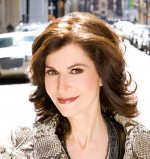Column Name
Title
Sharon Isbin started playing the guitar at age 9 when her family went to Varese, Italy, for a year—her father, a scientist and professor at the University of Minnesota, was invited to be a consultant there. She subsequently decided to pursue the guitar and had occasional lessons with Andrés Segovia; she also studied Baroque performance practice for 10 years with longtime Juilliard faculty member Rosalyn Tureck (Graduate School Degree with Distinction ’35, piano). After getting her bachelor’s and master’s degrees at Yale, Sharon taught at the Manhattan School of Music, where she got to know Joseph Polisi, who was then the dean. She came to Juilliard in 1989 to create the guitar department, and on April 10, to celebrate the department’s 25th anniversary, Juilliard, the New York chapter of the Recording Academy, and the Bruno Walter Auditorium film series will premiere the one-hour documentary Sharon Isbin: Troubadour with a Q&A afterward.
Body
Why did you start studying the guitar?
When we were in Italy, my older brother asked for guitar lessons, but his fantasy was to become the next Elvis Presley. When my parents brought him to a well-known Italian guitarist and former student of Segovia for lessons, he turned it down. I volunteered to take his place, and so began my wild journey—by default!
What was it like being the subject of a documentary?
This has been one of the most exciting projects—and one of the longest!—that I’ve ever been involved with. When Boston-based producer Susan Dangel began filming six years ago, no one could have guessed that it would span five years plus a year of post-production. The schedule kept getting extended because unexpected things would come up that had to be included, like my performing at the Grammys and the White House, and my collaborations with Joan Baez, Garrison Keillor, Mark O’Connor, Tan Dun, and various orchestras. There were also sessions with faculty members John Corigliano and Christopher Rouse plus Joan Tower, Martina Navratilova, David Hyde Pierce, and students at the Aspen Festival [where Sharon is the director of the guitar department] and Juilliard. I kept worrying, What if something else happens before it’s finished? But fortunately, it was completed in January.
Tell us about the origins of the guitar department at Juilliard.
Bruce MacCombie (Juilliard dean, 1986-92) and Joseph Polisi both knew my work at Yale when I was a student, and they invited me to create the department. It had been Segovia’s dream to start a guitar program at Juilliard, and I was honored to be offered this opportunity.
What has surprised you the most since the department’s creation?
Juilliard’s other departments welcomed the program enthusiastically from the start, and their embracing spirit supported my vision of making the guitar an integral part of the Juilliard community, not just a sideline, as it is in many other schools. I’ve taught students from more than 20 different countries, many of whom have become international prizewinners, leading performers, and inspiring teachers.
What was the biggest challenge in the creation of the department?
I chose to start it as a graduate-only program in order to establish a high level. A few years ago, we added an undergraduate degree, and both are thriving. The hardest part is deciding among the many talented applicants. I also raise scholarship and fellowship funds so that brilliant guitar students with little or no means can study here.
What qualities do you look for in your students?
I’m drawn to students who are passionate about what they do, who have the discipline and talent to pursue their dreams, and who are open-minded, creative, sensitive, and curious about the world.
What has changed most about the department and about Juilliard in the 25 years that you have been here?
Students have more opportunities than ever to explore interdisciplinary collaborations with the Dance, Drama, and Music divisions. It has also been inspiring to see Juilliard’s Jazz program flourish from its inception.
If you could be amazingly proficient at one other art form for a day, what would you be?
A Latin dancer. I’ve taken ballroom dance lessons for several years, with a passion for salsa, cha-cha, rumba, etc. But to be adept for one day, even one hour—that would be amazing!
What are you reading and listening to?
I just finished four intriguing books: My Greek Drama by Gianna Angelopoulos, about the Olympics; Enemies of the People by Kati Marton, which relates her family’s escape from Hungary; Empire of the Shadows by George Black, the history of Yellowstone; and Red Orchestra by Anne Nelson, about the Berlin underground in WWII. While preparing for our 18-city Guitar Passions tour in February, I listened to jazz guitarists Stanley Jordan and Romero Lubambo. And if you missed the 2014 Grammys, watch the video of Macklemore, Lewis, Madonna, Mary Lambert, and Queen Latifah singing “Same Love” while 33 gay and straight couples married. That was moving television history, and a true marriage of music, life, and social change.
If you could live anywhere for six months—no strings attached—where would it be?
I’m not sure what could top what I have: a home in New York City, summers at the Aspen Music Festival, and concert travels all over the world. O.K., maybe a seaside contemporary retreat in California!





